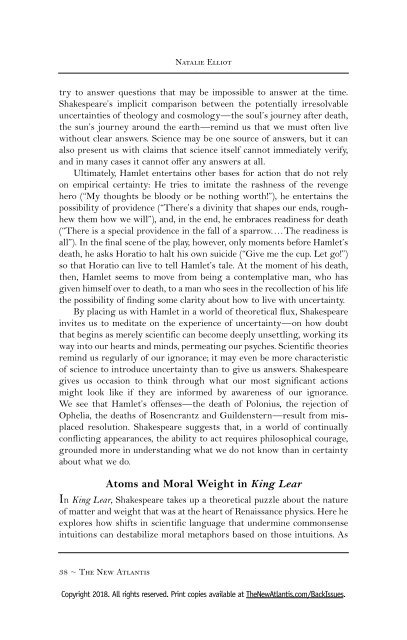The New Atlantis - Winter 2018 (Issue 54) uncompressed with cover
You also want an ePaper? Increase the reach of your titles
YUMPU automatically turns print PDFs into web optimized ePapers that Google loves.
Natalie Elliot<br />
try to answer questions that may be impossible to answer at the time.<br />
Shakespeare’s implicit comparison between the potentially irresolvable<br />
uncertainties of theology and cosmology — the soul’s journey after death,<br />
the sun’s journey around the earth — remind us that we must often live<br />
<strong>with</strong>out clear answers. Science may be one source of answers, but it can<br />
also present us <strong>with</strong> claims that science itself cannot immediately verify,<br />
and in many cases it cannot offer any answers at all.<br />
Ultimately, Hamlet entertains other bases for action that do not rely<br />
on empirical certainty: He tries to imitate the rashness of the revenge<br />
hero (“My thoughts be bloody or be nothing worth!”), he entertains the<br />
possibility of providence (“<strong>The</strong>re’s a divinity that shapes our ends, roughhew<br />
them how we will”), and, in the end, he embraces readiness for death<br />
(“<strong>The</strong>re is a special providence in the fall of a sparrow....<strong>The</strong> readiness is<br />
all”). In the final scene of the play, however, only moments before Hamlet’s<br />
death, he asks Horatio to halt his own suicide (“Give me the cup. Let go!”)<br />
so that Horatio can live to tell Hamlet’s tale. At the moment of his death,<br />
then, Hamlet seems to move from being a contemplative man, who has<br />
given himself over to death, to a man who sees in the recollection of his life<br />
the possibility of finding some clarity about how to live <strong>with</strong> uncertainty.<br />
By placing us <strong>with</strong> Hamlet in a world of theoretical flux, Shakespeare<br />
invites us to meditate on the experience of uncertainty — on how doubt<br />
that begins as merely scientific can become deeply unsettling, working its<br />
way into our hearts and minds, permeating our psyches. Scientific theories<br />
remind us regularly of our ignorance; it may even be more characteristic<br />
of science to introduce uncertainty than to give us answers. Shakespeare<br />
gives us occasion to think through what our most significant actions<br />
might look like if they are informed by awareness of our ignorance.<br />
We see that Hamlet’s offenses — the death of Polonius, the rejection of<br />
Ophelia, the deaths of Rosencrantz and Guildenstern — result from misplaced<br />
resolution. Shakespeare suggests that, in a world of continually<br />
conflicting appearances, the ability to act requires philosophical courage,<br />
grounded more in understanding what we do not know than in certainty<br />
about what we do.<br />
Atoms and Moral Weight in King Lear<br />
In King Lear, Shakespeare takes up a theoretical puzzle about the nature<br />
of matter and weight that was at the heart of Renaissance physics. Here he<br />
explores how shifts in scientific language that undermine commonsense<br />
intuitions can destabilize moral metaphors based on those intuitions. As<br />
38 ~ <strong>The</strong> <strong>New</strong> <strong>Atlantis</strong><br />
Copyright <strong>2018</strong>. All rights reserved. Print copies available at <strong>The</strong><strong>New</strong><strong>Atlantis</strong>.com/Back<strong>Issue</strong>s.


